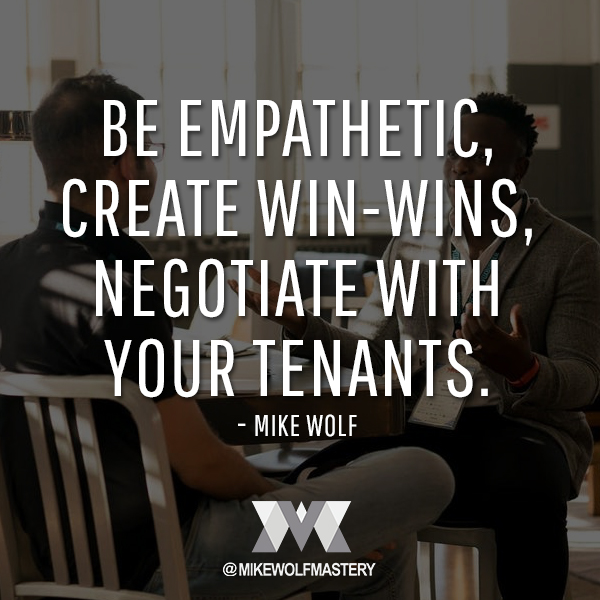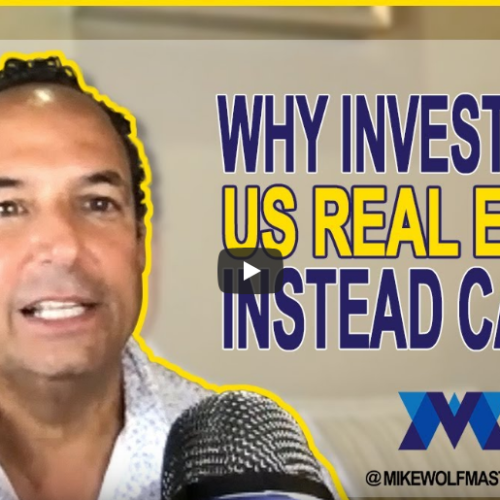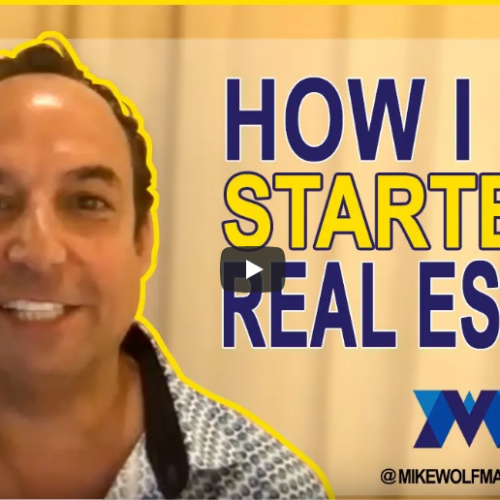Get New Posts via Facebook MessengeriTunes
Summary – Transcript
Hey, Mike Wolf from Mike Wolf Mastery. Today I’m coming to you from Calgary, Canada, where I am hunkered down. If you’re watching this during the COVID-19 pandemic of 2020, I know a lot of you have a lot–If you’re an investor already you have a lot of questions. If you’re thinking of getting into real estate, I seem to be getting a lot of people that maybe they’ve lost their job and they’re looking for a career change. We’re heading into probably the best time ever to be a real estate investor because there’s going to be a lot of people having issues. If you can solve their problems and create a win-win, you can help somebody else and at the same time monetize it. I’m going to teach you how to do that, but today I want to answer one of the questions that comes up a lot lately, mostly from people that have buy and hold properties, and they’re wondering, “If my tenant can’t pay rent, what do we do?”
Of course, the government is saying that there’s no evictions during this time, and I would hope that nobody would evict somebody during these times, whether they’ve got money or not to pay rent. Obviously, we’re in the middle of a very dangerous pandemic and we’re not going to kick people out on the streets. The other side of the equation is, as a real estate investor, as somebody who owns a revenue property, we need our revenue too. How do we deal with this? Of course, in Canada and the US and maybe some other countries, the government has basically almost made it sound like not only can people not be kicked out during these times, but they almost made it sound like people don’t have to pay the rent.
This is where you’ve got to be really strategic with how you handle it. I hope prior to this pandemic, you already had some sort of policy in place for when there’s a recession or when there’s times that lots of people are losing their jobs. If you don’t, I’m going to tell you what ours is. For those of you who are already investing with me in Atlanta through my turnkey properties, we’re already doing this for you, so you don’t have to worry about any of this. Our property management team is talking to your tenants already, negotiating on your behalf, and figuring out a win-win. In any case, if you’re managing your own properties, I’m going to give you some pointers on what you can do to make this as stress-free as possible for both yourself and your tenants.
First of all, it’s very important to be empathetic. Prior to rent day, you’re going to have a conversation with your tenants. You’re not going to do this on rent day, you’re going to have this in advance, and as early as possible, so that you can prepare for what’s going to happen or not happen on rent day. First of all, you’re going to put health first. When you get on the call with them, first thing you need to do is ask how they’re doing, are they healthy? Make sure that their loved ones are safe, that they’re safe. Make sure that everything is good in their home since they’re spending a lot of time there. That’s what you’re going to do first. You’re not going to talk numbers, you’re not going to talk rent, you’re not going to talk any of that stuff other than health first.
Just like you want to be empathetic towards your tenant, you also want to create empathy from them towards you because a lot of tenants assume, “Oh, you’re the landlord.” They assume that we’re gazillionaires if that’s a word. They think that we’re living in some castle, our life is perfect, and this pandemic isn’t affecting us in any way, and the money, whatever, it’s not a big deal. Sometimes they think that the owners of their homes are big corporations that own thousands and thousands of homes and they’re just a number, and if you don’t get their rent you’re going to be fine.
You also want to let them know that, “Hey, you’re safe, but guess what? These times are tough for me, too. I’ve got mortgage payments and I’m paying insurance and property taxes on the home that you’re in, so I’m just trying to create a win-win.” You’re not going to even get too much into detail yet because you’re not going to assume that they can’t afford rent. A lot of people are still working. They may be working from home. A lot of people, even if they’re not working, they have money saved up. Not everybody lives paycheck to paycheck. If you did a good job picking tenantsbefore this all happened, then one of the things you should have looked at is their reserve funds and how much money they’ve got in their bank account. Obviously, you don’t want to put people in that are living paycheck to paycheck. They miss one paycheck, guess who’s not getting paid? You. These are the things you want to look at in advance.
One of the other reasons why we’ve been so successful–By the way, our delinquency rate in Atlanta is much lower than the national average rate now for April 1st. That’s because also we’re doing rent-to-owns for our tenants. They’ve got some skin in the game. Typically a rent-to-own tenant is somebody who wants to purchase that property. They’re typically going to take better care of the home, they’re going to be moreresponsible, they’re going to be less expecting you to give them handouts. They just have a different mindset. Something to think about in the future as you’re putting future tenants into your properties. Once again, you want to get these people a little sympathetic towards the fact that you’re not living the high life, that you have bills too. You’ve got to put food on your table, feed your family, and not adversarial at all. You want to make it so you’re both on the same page. You and the tenants on the same page going through the same pandemic together, having the same fears, the same challenges. Very, very important.
Then you want to start talking about getting a little bit into the money part. Say, “Are you still working? Is everything good?” You’re going to have to get to the money part. Some of the people are going to be fine at this point. You’ve created some rapport hopefully, so hopefully, they’re not going to come to you and treat you like you’re the bad guy. These people will be able to pay in full. That’s been the case for most of our clients, a vast majority of them could pay in full. If they’re having financial problems, you don’t want to go straight to, “Oh. Well, don’t worry. You don’t have to pay.” You never want to have them not pay because, once again, the habit of not paying is going to take a long time if they ever pay again.
The next thing you’ll do is actually before you get on the call, is you’re going to make either a spreadsheet or an email that gets sent to them or you’re going to build a website. Have somebody build the website for you with a list of all the different subsidies that might be available to them. I know in Canada right now they are offering people 2,000 a month for the next four months of cash. It doesn’t necessarily have to go towards paying you, by the way. You want to make sure that they understand the importance of paying the rent and keeping up with it. At this point, once again, you’re still not offering them anything. You’re basically saying, “Hey, here’s some options.” You might also tell them that they should maybe check with some relatives, see if their relatives could help them out. If you’re not already taking credit cards in some way, or PayPal, maybe offer to take care of the fees if they do a cash advance to pay you. You want to make it so that there’s a very good chance that they’re going to pay you.
Now, if they say none of these things are going to work, they actually have no options or credit cards are maxed out, all their relatives are in a really bad spot, like I said, you’ve got to tell them about all these different subsidies at the federal, state or provincial level, the municipal level. You’ll say, “Go apply for all these things.” Then you’re going to ask how much can they afford to pay right now? You don’t want to take zero for an answer. You want to get something right now because like I said, once they don’t make a payment, once they get used to that, they are not going to get back on track for a long, long time. You’re going to tell them that whatever they don’t pay now they’re going to have to make up for at a later time. If their rent is $1,000 a month and they only can afford to pay $500 right now, you’re going to tell them, “That other $500, if you miss three months you’re going to be behind by $1,500. Do you want to put that over 12 payments or 15 payments or six payments?” No matter what, they’re going to have to pay that back.
The other thing you might want to do is to incentivize it for them to pay you now. If the rent’s $1,000 perhaps say, “If you can pay me now, I get the times are really tough. I tell you what. Why don’t you just pay me $900? If you pay me this week it’s only going to be $900 instead of $1,000 and we’ll do that for the next three months. I’ll give you $100 off your rent.” You really want to encourage them to start to keep up to date if at all possible. If not, to make installments. Then you also want them to apply for anything that they’re eligible for and keep you posted on that because you want to make sure that they pay you and that money comes in and not buy the newest iPhone or a fancier TV to watch Netflix on.
These are all really important things that will most likely net you more money in your pocket, keep a relationship with your tenant still on good terms. Once again, you always have to make sure you have some sort of policy. You don’t want to wing it when it comes to this sort of thing. You also don’t want to be unsympathetic. You’ve got to remember these people are struggling. A lot of people are in fear right now, and a lot of people have sick relatives. Be empathetic, create win-wins, negotiate with your tenants. If you do that, you’re going to have a much better long term relationship with your existing tenants.
I hope you found that helpful. If it did, pleaselike this video, share it with your friends, and make sure you subscribe to my YouTube channel so you get all my latest videos. As long as I’m hunkered down I’m going to be creating a lot of content. Send your questions to me, info@mikewolfmastery.com. I try to answer each and every single question that I get. Also, if you want to invest in properties the easy way, take a look at my Passive Income Masterclass, where I teach you how you can invest in turnkey properties and have other people dealing with your tenants so you’re not dealing with all this stuff. Getting more cash flow, more passive income, and doing less work. Working smart instead of hard. Please click the link below to get that. I hope you’re doing well, stay safe, and can’t wait to see you soon. Take care.
QUOTES TO CONSIDER
[Follow Mike on Instagram for tons of great quotes]






